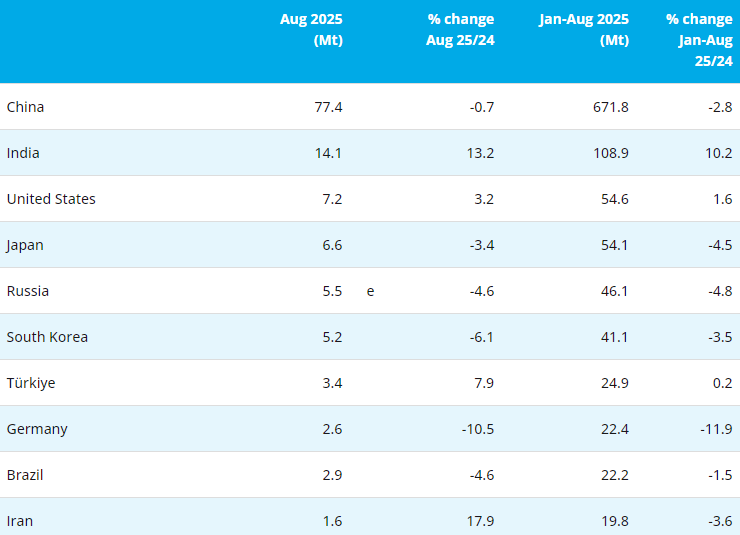A persistent slump in demand for steel that has left plants idled worldwide for nearly a year is pushing top global producers to expand in India, which along with China is a rare bastion of growth.
Strong local demand driven by infrastructure projects and rebounding car sales has led big foreign steel makers to seek out investments in a fragmented local industry after efforts to develop independent projects met with delays.
“India is on the radar of most companies given the lucrativeness of the market,” said Rakesh Arora, an analyst at Macquarie Research. “India has both demand growth and cheap iron ore going for it.”
Midlevel firms including Usha Martin, Electrosteel Casting, Bhushan Steel and Monnet Ispat are seen as attractive targets for joint ventures or acquisitions by foreign companies keen to enter a market beset by regulatory hurdles and land acquisition issues, analysts said.
Smaller, less-competitive domestic players, however, could see their market positions under threat as global players increase their presence in the country. ArcelorMittal, the global leader, said this month it would acquire a one-third stake in the Indian company Uttam Galva, and more such deals are expected given the difficulty of going it alone in India.
“It is very difficult for someone coming from outside to set up a greenfield project,” said Nittin Johari, chief financial officer of Bhushan Steel. “Foreign firms have realized it’s not possible to do business stand-alone in India.” Bhushan is in talks with Sumitomo Metal Industries to jointly build a steel plant in India.
Global steel demand slumped by more than a tenth in the past year, but India’s 55 million-ton steel market has seen nearly 10 percent growth as its $1 trillion economy focuses on building physical infrastructure and as auto sales revive.
Still, absolute demand remains far below global levels, with per capita steel consumption at 44 kilograms per year, compared to 100 kilograms in Brazil and a global average of 198 kilograms.
“India will continue to see growth,” Tata Steel’s chairman, Ratan Tata, told shareholders last month. “Per capita consumption is very low, so the potential is very high.”
Tata, the world’s No. 8 steel maker, expects demand in India to rise 25 percent annually, and is raising its local capacity by a third to 9.8 million tons. Other local producers are also expanding.
Smaller steel companies, which make up nearly half the industry in India, are attractive targets given their value-added steel capacity and their coal and ore reserves.
“Many small steel companies have cornered large iron ore and coal resources and are pursuing large steel projects,” Mr. Arora said. “If there’s a partnership or a stake sale, they can see a large jump in valuations.”
Global steel producers have long coveted — and been frustrated in — India, the third-largest economy in Asia.
ArcelorMittal and the South Korean company Posco, which plan to spend a combined $24 billion to build 24 million tons of capacity in eastern India, have yet even to secure land more than two years after announcing their plans. Both have faced protests from local farmers against land acquisitions and delays in receiving mining leases.
With foreign players looking at smaller companies as a way into India, domestic players may face stiffer competition.
“Any such move would be potentially negative to the Indian integrated steel producers, given the entry of a large competitor and also the potential loss of a customer,” JPMorgan Chase said in a note to clients after the deal between Arcelor and Uttam Galva was announced.
India’s steel-making capacity, only a tenth of China’s, is dominated by three large local producers, Tata Steel, the Steel Authority of India and JSW Steel, leaving a large number of makers of higher-end steel with less than one million tons of capacity each. This means that foreign companies have few options to buy into existing capacity, with large player unwilling to sell and smaller firms unattractive.
“I know there are people interested in India, but the size and scale they are talking about does not exist here,” said Manikkan Sangameswaran, director of BridgeLink Advisers and a former ABN Amro banker. -Reuters
Copyright © 2013 Ferro-Alloys.Com. All Rights Reserved. Without permission, any unit and individual shall not copy or reprint!
- [Editor:editor]



 Save
Save Print
Print Daily News
Daily News Research
Research Magazine
Magazine Company Database
Company Database Customized Database
Customized Database Conferences
Conferences Advertisement
Advertisement Trade
Trade















Tell Us What You Think